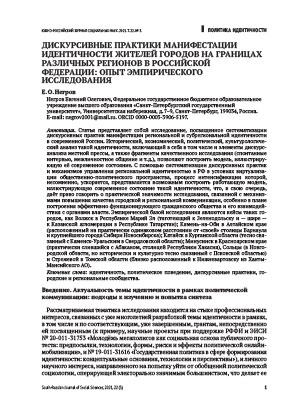Abstract
The article deals with a study of the systematization of discursive practices of manifestation of regional and subregional identity in modern Russia. Historical, economic, political, cultural analysis of such an identity, including, among other things, elements of discourse analysis of the local press, as well as fragments of qualitative research (spontaneous interviews, interpersonal communication, etc.), allow to build a model illustrating its current state. By dint of the systematization of discursive practices and mechanisms for managing regional identity in the Russian Federation in the context of the virtualization of the socio-political space, the process of intensification of which is undoubtedly accelerating, it seems possible to build a working model. This model illustrates the current state of such identity, which, in turn, gives the right to talk about the practical significance of the study related to the mechanisms for improving the quality of urban and regional communication, especially in terms of building an efficiently functioning civil society and its interaction with authorities. The empirical base for the research is the cases of such cities as Volzhsk in the Republic of Mari El (tending to Zelenodolsk and, more broadly, to the Kazan agglomeration in the Republic of Tatarstan); Kamen-na-Obi in the Altai Territory (located at almost the same distance from «its» capital Barnaul, and Novosibirsk, the largest city in Siberia); Kataysk in the Kurgan region (closely related to Kamensk-Uralsky in the Sverdlovsk region); Minusinsk in the Krasnoyarsk Territory (practically merged with Abakan, the capital of the Republic of Khakassia), Soltsy (in the Novgorod Region, but historically and culturally closely related to the Pskov Region) and Strezhevoy in the Tomsk Region (close to Nizhnevartovsk from the Khanty-Mansi Autonomous region).
Keywords
References
Акопов, С.В. (2015). Интернет и политика. Модернизация политической системы на основе инновационных политических интернет-коммуникаций. Москва: КноРусю.
Бовина, И.Б., Дворянчиков, Н.В. (2020). Поведение онлайн и офлайн: две реальности или одна? Психологическая наука и образование, 25(3), 101–115.
Визгалов, Д.В. (2011). Брендинг города. М.: Фонд «Институт экономики города».
Добринская, Д.Е. (2018). Сообщества в эпоху Интернета. Вестник Московского университета, 24(4), 59–79. DOI: 10.24290/1029-3736-2018-24-4-59-79
Енина, Л.В. (2016). Идентичность как дискурсивный концепт и механизмы дискурсивной идентификации. Политическая лингвистика, 6(60), 159–167.
Заббаров, А.Г. (2011). Сетевые структуры общественных объединений в современном политической процессе (Автореферат кандидатской диссертации). Саратов.
Замятина, Н.Ю. (2012). Территориальные идентичности и социальные структуры. Общественные науки и современность, 5,151–163.
Казаков, А.А. (2020). Политическая роль медийного грамотности в условиях технологической трансформации массовой коммуникации (Автореферат докторской диссертации). Москва.
Канашевич, Н. (2018). Постижение идеологии как поиск парадигмы: от эпохи модерна к постмодерну. Thesaurus, 5, 87–122.
Коньков, А.Е. (2020). Цифровизация политики vs политика цифровизации. Вестник Санкт-Петербургского университета. Международные отношения, 13(1), 47–68. DOI: 10.21638/spbu06.2020.104
Леонтович, О.А. (2015). Позитивная коммуникация: постановка проблемы. Вестник РУДН, серия Лингвистика, 1, 164–177.
Мисников, Ю.Г., Филатова О.Г. (2019). Интернет-дискуссия как форма электронного участия: российская специфика. Мониторинг общественного мнения: Экономические и социальные перемены, 5, 320–340. DOI: 10.14515/monitoring.2019.5.15
Морозова, Е.В., Мирошниченко, И.В., Семененко И.С. (2020). Развитие местных сообществ: потенциал политики идентичности. Полис. Политические исследования, 3, 56–77. DOI: 10.17976/jpps/2020/03/05
Мухортов, Д.С., Краснова, А.В. (2016). Дискурсивные маркеры манипуляции как реализация субъективно-оценочного акта говорящего. Политическая лингвистика, 6(60), 120–125.
Назукина, М.В. (2019). Символические аспекты российского регионализма: на примере конкурсных практик. Ars Admimistrandi (Искусство управления), 11(4), 532–550. DOI: 10.17072/2218-9173-2019-4-532-550
Орех, Е.А. (2014). Визуальные методы в изучении социального пространства города. Человек, 6, 35–45.
Пономарев, Н.Ф. (2021). Постмодернистские стратегические коммуникации. Постправда, мемы, трансмедиа. М.: РУСАЙНС.
Поцелуев, С.П. (2008). Политические парадиадоги. Ростов-на-Дону: Изд-во ЮФУ.
Радина, Н.К. (2018). Цифровая политическая мобилизация онлайн-комментаторов материалов СМИ о политике и международных отношениях. Полис. Политические исследования, 2, 115–129.
Семененко, И.С. (2017). Идентичность: Личность, общество, политика. Энциклопедическое издание. М.: Весь Мир.
Сидоров, В.А. (2018). Коммуникативные стратегии XXI века: определение и анализ предпосылок. Вестник Санкт-Петербургского государственного университета. Язык и литература, 15(2), 300–311. DOI: 10.21638/11701/spbu09.2018.212
Сидоров, В.А., Быков, И.А., Гладченко, И.А. и др. (2019). Коммуникативные агрессии XXI века. СПб.: Алетейя.
Смирнягин, Л.В. (2011). Мегарегионы как новая форма территориальной организации общества. Вестник Московского университета. География, 5(1), 9–15.
Сморгунов, Л.В. (ред.) (2018). Публичная политика: Институты, цифровизация, развитие. М.: Аспект Пресс.
Сморгунов, Л.В. (ред.) (2021). Аутсорсинг политических суждений: проблемы коммуникации на цифровых платформах. Москва: РОССПЭН.
Чекменев, Д.С. (2020). Конструирование общественно-политического дискурса в современной российской публичной политике (Докторская диссертация). Пятигорск.
Шарапов, Р.И. (2017). Условия политической мобилизации в сети Интернет. Социодинамика, 10, 1–8. DOI: 10.25136/2409-7144.2017.10.22073
Lewis, E. (2017). Intergenerational Solidarity. In 10th Biennial Gender, Work & Organisations Conference (pp. 9–34). Sydney, Australia.
Tufekci, Z., Wilson, C. (2012). Social Media and the Decision to Participate in Political Protest: Observations from Tahrir Square. Journal of Communication, 62(2), 363–379. DOI: 10.1111/j.1460-2466.2012.01629.x


